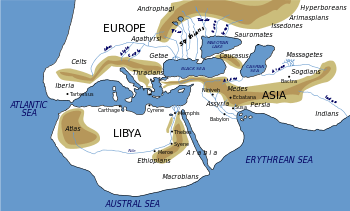Scylax of Caryanda
Scylax of Caryanda (Greek: Σκύλαξ ο Καρυανδεύς) was a renowned Greek explorer and writer of the late 6th and early 5th centuries BCE. His own writings are lost, though occasionally cited or quoted by later Greek and Roman authors. The periplus sometimes called the Periplus of Scylax is not, in fact, by him; that so-called Periplus of Pseudo-Scylax was written in about the early 330s BCE by an unknown author working in the ambit of the post-Platonic Academy and/or the Aristotelian Peripatos (Lyceum) at Athens.
Exploration and literary works

In about 515 BCE, Scylax was sent by King Darius I of Persia to follow the course of the Indus River - which gives India her name - and discover where it led.[1] Scylax and his companions set out from the city of Caspatyrus (Gandhara), which would mean he may have entered the Indus River in the northwestern part of the Indian subcontinent, somewhere in the borderlands of present-day Afghanistan and Pakistan. Scylax sailed down the river until he found it reached the Arabian Sea. He then sailed west across the Arabian Sea until he arrived at the Red Sea, which he also explored. He travelled as far as the Red Sea's western end at Suez, before returning to report to Darius I. His entire journey took thirty months.
Such, at least, is the prima facie narrative based on Herodotos. He has also calculated the likely date of Scylax's departure for "India" (modern day Sindh) as July 518 BCE.[2]
Scylax was famous in the ancient world. He is mentioned by Strabo as an "ancient writer."[3] According to the Suda, he also wrote (perhaps "in the decades around 480 BC"[4]) a life of his contemporary, Heraclides of Mylasa (τὰ κατὰ Ἡρακλείδην τὸν Μυλασσῶν βασιλέα), who is mentioned in Herodotus 5.121.
In popular culture
- In the historical fiction novel Creation by Gore Vidal Scylax of Caryanda appears as a character who is on such familiar terms with King Darius I of Persia that they engage in humorous banter about extending Persian rule to India.
Ancient sources
See also
Notes
- ↑ Lendering, Jona (n.d.). "Scylax of Caryanda". Livius. Retrieved 2008-05-01.
- ↑ Panchenko, D. V., ‘Scylax’ circumnavigation of India and its interpretation in early Greek geography, ethnography and cosmography, I’, Hyperboreus, 4. 2 (1998), 211–42; id., ‘Scylax in Philostratus’ Life of Apollonius of Tyana’, Hyperboreus, 8. 1 (2002), 5–12; id., ‘Scylax’ circumnavigation of India and its interpretation in early Greek geography, ethnography and cosmography, II’, Hyperboreus, 9. 2 (2003), 274–94.
- ↑ Strabo, Geography 14. 2. 20 (Σκύλαξ ὁ παλαιὸς συγγραφεύς). Scylax was mentioned 12. 4. 8 and 13. 1. 4
- ↑ Arnaldo Momigliano, The Development of Greek Biography, Harvard UP, 1971, p. 29
External links
- Dictionary of Greek and Roman Biography and Mythology
